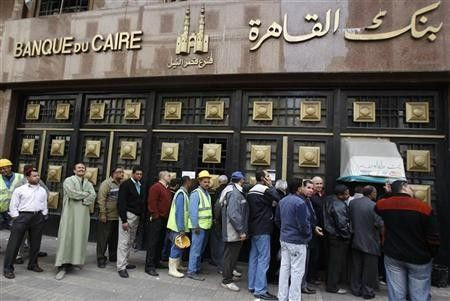Egypt banks face queues, pounds dips only slightly

Egypt's Banks opened for the first time in a week to queues of customers seeking to access their accounts on Sunday, but the Egyptian pound weakened only modestly after violent protests gave way to calmer political talks.
Bankers had braced for foreign investors and local business executives to flee the pound but the currency closed at 5.93 to the dollar, having weakened by about 1.3 percent since it was last traded on January 27.
Egypt's AlexBank, a former big state bank that has been privatised, said after trading it had ended its first open day with a net cash surplus of 4 million pounds.
The way things are looking we do not expect a run on the pound at the moment, Angus Blair, head of research at Beltone Financial, said. We think that the prevailing atmosphere is a lot calmer than we might have assumed last week. We assumed some dollarization of the pound but that the system can cope.
I think that each day is seeing an incremental improvement in stability. If the improvements continue like this, then it would be a near new normal by the end of the week, he said.
BANK REASSURANCE
The pound had weakened to six-year lows in the two days of trading that followed the first protests on January 25.
The central bank had sought to reassure investors over recent days and governor, Farouk el-Okdah, gave a rare television interview on Saturday night before banks opened.
Of course, over the next week we will have some problems but we will be able to handle them because we have had experience before, Okdah said. I am confident that the market will be orderly.
Since then protesters have been beaten by police and attacked by supporters of President Hosni Mubarak in Cairo and across Egypt. Cars and ruling party buildings have been torched. The army was sent onto the streets to restore order.
Egypt, once an island of stability in a tumultuous region, has seen its political establishment shaken to the core. Mubarak, 82, had been widely expected to run for president again in September, but has now said he will step down.
Protesters are still in central Cairo demanding the president end his 30-year rule now. But violence has subsided and there was a huge but quiet protest on Friday.
For private investment, I don't think investors will pull out of Egypt, Mona Mansour, an economist at CI Capital, said.
Maybe we'll ... see more outflow from the stock market and fixed income. We may see also higher T-bill yields. These are the short-term impacts of this crisis, she said.
The stock market has yet to re-open and a bourse official said it would stay closed on Tuesday.
Banks and ATM machines in downtown Cairo have drew long queues of customers anxious to withdraw money before banks close after a shortened working day at 1:30 p.m. (1130 GMT). Some clients were still anxious despite the relative calm.
I have been visiting several bank branches downtown since nine in the morning, said Soad Mohamed, 62, who wanted to cash in her pension.
Every bank I go to, they tell me, the bank is closed. I have one more hour to go before banks close again, and I still have not been able to withdraw the amount of money I need.
Army vehicles still stand guard at intersections where soldiers had erected sandbag barriers, as buses dropped employees off at large state banks.
While clients queued, some employees started taking names to create lists to ensure order when they enter.
We have to have some order around here. People are anxious to get paid and pull money out. It has been almost two weeks and life is at a standstill, said Metwali Sha'ban, a volunteer making a list of customers to organise who would enter first.
Some 341 bank branches, including 152 in Cairo, were opened across the country.
In Tahrir Square, the focal point of nearly two weeks of protests against Mubarak, soldiers opened the doors of the main government administrative building, the Mugamma.
© Copyright Thomson Reuters {{Year}}. All rights reserved.





















